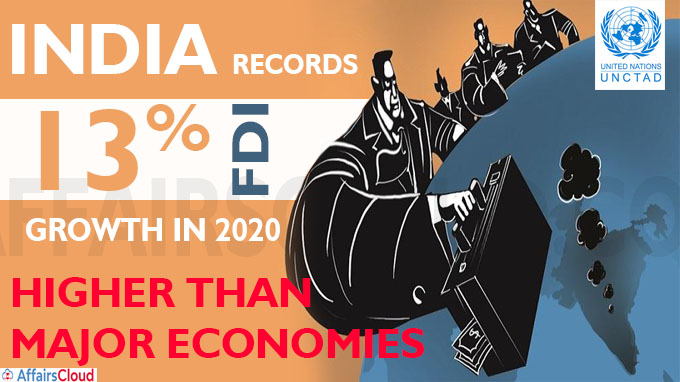 In accordance with the United Nations Conference on Trade and Development (UNCTAD)’s 38th Global Investment Trends Monitor, after the 1990s, the year 2020 saw a fall down in Global foreign direct investment (FDI) which decreased 42% to $859 billion from $1.5 trillion in 2019.
In accordance with the United Nations Conference on Trade and Development (UNCTAD)’s 38th Global Investment Trends Monitor, after the 1990s, the year 2020 saw a fall down in Global foreign direct investment (FDI) which decreased 42% to $859 billion from $1.5 trillion in 2019.
- Contrarily, India saw a 13% increase in FDI to $57 billion which is driven by investments in the digital sector. China pocketed a maximum FDI of $163 billion with 4% increase i.e. it became the world’s largest FDI recipient even being a place of COVID-19 evolution.
- Notably, a major decline in FDI inflows was concentrated in developed countries such as the United Kingdom (UK), the United States (US), Italy, Russia, Germany, and Brazil where fund flows fell by 69% to an estimated $229 billion.
- FDI flows to developing economies decreased by 12% to an estimated $616 billion, they accounted for 72% of global FDI – the highest share on record.
- FDI to transition economies declined by 77% to $13 billion.
UNCTAD 2021 projections:
The organization projected weak FDI flows in the world due to uncertainty over the evolution of the COVID-19 pandemic. It has projected a 5% to 10% FDI slide in 2021 in 2020’s World Investment Report. On the other hand, the global economy will recover in 2021.
India’s story
–Apart from FDI in the digital sector, another key reason for FDI rise in India is merger and acquisition (M&A) as Cross-border M&A sales grew 83% to $27 billion. For eg:
- Facebook’s acquisition of 9.9% stake in Reliance Jio platforms, via a new entity, Jaadhu Holdings LLC.
- There were similar deals in the energy sector too.
- India and Turkey are attracting record numbers of deals in information consulting and digital sectors, including e-commerce platforms, data processing services and digital payments.
Key Points:
–The fall was highly uneven across developing regions viz. -37% in Latin America and the Caribbean, -18% in Africa and -4% in developing countries in Asia i.e. estimated $476 billion.
–Among other developed economies, flows to Australia fell (-46% to $22 billion) but increased for Israel (from $18 billion to $26 billion) and Japan (from $15 billion to $17 billion).
–Flows to members of the Association of Southeast Asian Nations (ASEAN) contracted by 31% to $107 billion,
–FDI in South Asia rose by 10% to $65 billion.
–Flows to North America declined by 46% to $166 billion, with cross-border mergers and acquisitions dropping by 43%. Announced greenfield investment projects also fell by 29% and project finance deals tumbled by 2%.
–Overall FDI flows in developing economies appear relatively resilient, greenfield announcements fell by 46% and international project finance by 7%.
- Greenfield investment is a kind of FDI, in which the parent company creates a subsidiary in the host country and builds its operations from the ground up.
- Sharply lower greenfield project announcements (-35% in 2020)
Recent Related News:
i.On November 19, 2020 United Nations Conference on Trade and Development (UNCTAD) released a report titled ‘The Impact of the COVID-19 Pandemic on Trade and Development: Transitioning to a New Normal’ . The report states that a viable novel coronavirus disease (COVID-19) vaccine will not halt the spread of economic damage. The economic setback will be experienced for a long time, especially by the poorest and most vulnerable countries.
ii.According to “The Least Developed Countries Report 2020: Productive Capacities for the New Decade” released by UNCTAD (United Nations Conference on Trade and Development), Pandemic has pushed around 32 Million People into Extreme Poverty in the Least Developed Countries (LDCs).
About United Nations Conference on Trade and Development (UNCTAD):
Established– 1964, by the United Nations General Assembly (UNGA)
Secretary-General– Mukhisa Kituyi of Kenya
Headquarters– Geneva, Switzerland




